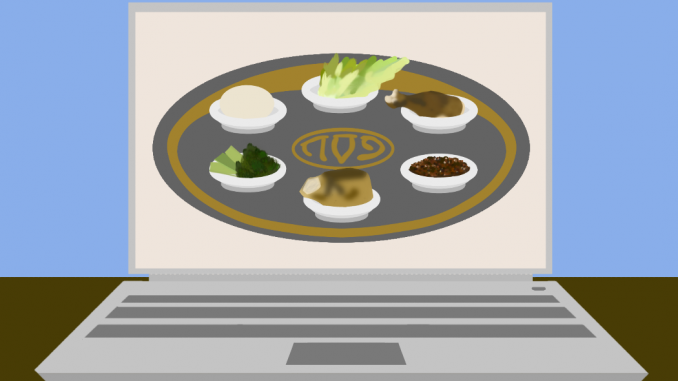
Last year, Emma Holtzman celebrated Passover with her extended family on a Zoom call. This year, her plans are still uncertain, but she’ll likely attend another Zoom meeting as an alternative to gathering in person, she said.
“It was just me, my parents and my brother in California,” said Holtzman, a freshman health professions major. “Then we Zoom-called my grandparents.”
This year for Passover, some Jewish students and organizations are still modifying their observances of the major holiday in accordance with the social distancing guidelines from the Centers for Disease Control and Prevention. Some students are still celebrating on Zoom, but others are able to gather in person with vaccinated family members.
Holtzman’s previous celebrations with extended family included a custom Haggadah with songs and a play that her aunt created, she said.
“She put in different songs and things into it,” Holtzman added. “We have a plague song where she’ll throw frogs. It’s a little interactive show.”
The Haggadah is a collection of texts that retells the story of the Egyptian Pharaoh freeing Jewish people from slavery and guides the ritual feast called a Seder, which is held on the first night of the seven-day-long holiday beginning at sundown on March 27 this year.
For students who are not able to celebrate in person, the interfaith council organization Hillel at Temple University offers Zoom Seder options, said Rabbi Daniel Levitt, the executive director of Hillel.
Hillel, which promotes leadership and community among Jewish students, closed their in-person operations last year, so Levitt celebrated with his immediate family. This year, he intends to celebrate with his extended family members who’ve been vaccinated, he said.
“That’s a big deal,” said Levitt, who is vaccinated. “We will not be isolated like we were last year.”
It is safe for fully vaccinated people to gather indoors without masks and with unvaccinated people from one other household, unless someone in that household is at a high risk for COVID-19-related complications, according to CDC guidelines.
In his Passover teachings, Levitt incorporates concepts of freedom and servitude with guiding questions for self-reflection, he said.
“What are the values that are forming the choices and decisions we make? Are they truly free decisions or are we just going along with what’s natural and around us?” Levitt added. “The message of Passover is to be free to really choose the thing you are compelled to do and the person you’re compelled to be.”
The meanings and values of Passover vary between students’ experiences, even in a virtual form.
To Rita Rom, a freshman supply chain management major, food is an integral part of her Passover.
“I really love making matzo ball soup with my family,” Rom said. “We all roll the matzo balls together. It’s nice to have a new diet for a week to try and explore.”
According to the Torah, when the Jewish people were freed from Pharaoh’s control, they only had a short amount of time to leave before he changed his mind, Rom said. Therefore, the bread they quickly made was unleavened.
“We eat matzah to remember that,” Rom said. “All the foods on the Seder plate represent something.”
Rom’s favorite matzah variations are matzah pizza with goat cheese and nutella-covered matzah, she said.
For the second consecutive year, Rom is unable to celebrate Passover with her extended family because of the COVID-19 pandemic.
“It was definitely sad because Passover is a holiday where you gather with a lot of people, and it was very different than years before,” Rom added.
Emmie Kaplan, a freshman tourism and hospitality major, also celebrated on Zoom last year and is looking forward to Passover this year because it’s her favorite holiday, she said.
“I love it and spending it with my family,” Kaplan added. “I’m really excited for this year’s Seder, even if I have to see my extended family over Zoom.”


Be the first to comment